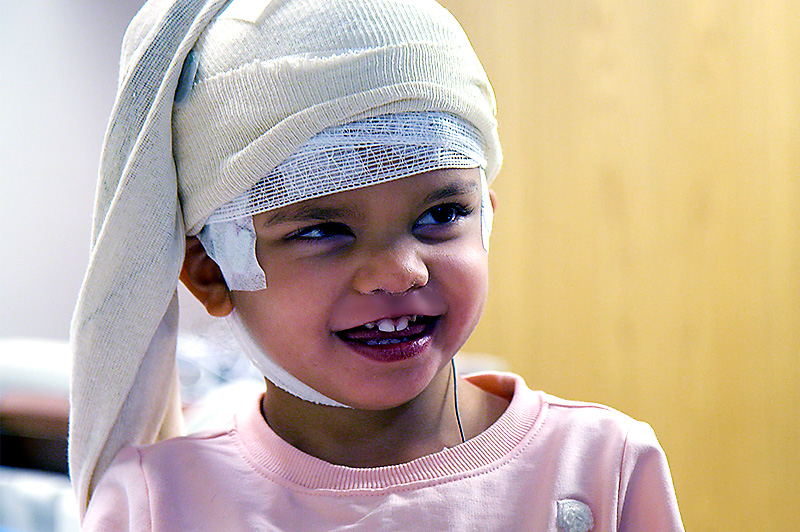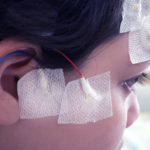A family’s search for answers and hope for PACS1 syndrome

Alya, 9, was about three weeks old when her mother, Taruna, noticed movements and behaviors she was concerned might be seizures. What followed were multiple hospitals, multiple tests, and eventually a diagnosis of PACS1 syndrome. This rare genetic neurodevelopmental disorder can lead to intellectual disabilities and delays and currently has no cure.
“We were told to go home and do our best to manage the symptoms,” Taruna says of when she and her husband, Nicolas, received Alya’s diagnosis.
Since then, Taruna and her family have launched an international search for answers for Alya and other children with PACS1 syndrome. Their pursuit has brought them to Dr. Tobias Loddenkemper and the Epilepsy Center at Boston Children’s Hospital. Dr. Loddenkemper and his team specialize in difficult-to-treat and prolonged seizures, status epilepticus, seizure detection, and seizure prediction.
Not just typical baby movements
“It wasn’t a typical seizure,” Taruna says of what Alya started experiencing as a baby. “Her face would turn red, and her eyes would go blank; it just looked so bad. The seizures were very short, but they happened often enough that I just knew something was really wrong.”
Alya was initially treated for acid reflux, but deep down, Taruna and Nicolas knew Alya’s situation was something bigger, so they took her to a neurologist near their home in Connecticut. An EEG confirmed unusual brain activity, but her care team couldn’t pinpoint an exact cause. Meanwhile, Alya’s seizures increased in frequency and intensity.
On Christmas Day — at just a month old — Alya experienced a seizure every 15 minutes, so Taruna and Nicolas rushed her to the ER. She was put on seizure-control medication, which worked well for about a year. All subsequent tests, including gene paneling to look for specific genetic mutations, came back normal.
The diagnosis journey: from exome sequencing to finding a specialist
When Alya was 2, her seizures started up again. They most often happened during the night, so Taruna took to sleeping next to Alya to keep watch.
Distraught about the return of Alya’s seizures despite being on medication, Taruna and Nicolas brought Alya to a different hospital hoping to get a definitive answer about what was causing them. As part of her evaluation, Alya received whole-exome sequencing.
While panel testing focuses on analyzing genes associated with specific conditions and diseases, whole-exome sequencing examines all protein-coding genes and can detect a wider range of mutations that may not be associated with a particular disease. It was whole-exome sequencing that unveiled the mutation in Alya’s PACS1 gene, or PACS1 syndrome. Seizures are common in PACS1 syndrome; Alya’s were categorized as electrical status epilepticus in sleep (ESES).
When Alya was diagnosed with PACS1 syndrome, there were only around 50 known cases in the world, and her care team didn’t know of any current research or treatment. Taruna and Nicolas reached out to friends and family for leads on anyone who might be familiar with either PACS1 or ESES. One name they repeatedly heard as an expert in treating status epilepticus and related variants was Dr. Loddenkemper. “We brought her to Dr. Loddenkemper, and we’ve been with him ever since,” Taruna says. “I always tell people that Boston Children’s has some secret sauce. I don’t know what it is, but they have something. They think of everything.”
Exploring a ketogenetic diet for seizure control
Part of thinking of everything for Alya was trying a ketogenic diet to help control her seizures.
The ketogenic diet is a medically guided low-carb, high-fat diet that forces the body to use fat for energy; this process produces ketones which can have an anti-epileptic effect on the brain and lead to improved seizure control. As part of her comprehensive treatment plan managed by Dr. Loddenkemper and overseen by Dr. Anna Pinto of the Epilepsy Center’s ketogenic diet program, a ketogenic diet has helped dramatically reduce Alya’s seizures.
Today, Alya is a very happy child who loves skiing, puzzles, and going to school. She has significant intellectual disabilities, cognitive delays, and limited verbal ability, but she has flourished through speech, physical, and occupational therapy, and with the use of a communication device.
“Alya doesn’t talk, so I don’t know what she knows, and I don’t know what she doesn’t know,” Taruna says. “But when she uses her device, it’s like, ‘whoa’. It’s amazing what she can do on that thing!”
Supporting research and connecting with families

Finding a precise diagnosis for Alya’s condition and treatment to help manage her seizures was just a starting point for Taruna and Nicolas. Determined to do more to help their daughter and others with PACS1 syndrome, the couple started the PACS1 Syndrome Research Foundation to fuel funding for research into the disease. The foundation has introduced them to families around the world looking for answers and hope for their children.
“PACS1 is a lifetime condition; it isn’t going to go away next week, so I try to be honest with families,” Taruna says. “I try to stick to the facts about PACS1 syndrome because everyone has their own process of grieving and navigating their feelings about it, so I feel like I’m most effective with giving facts. But one thing I do share is, if you’re at Boston Children’s, you’re at the best place you can be.”
Learn more about the Epilepsy Center at Boston Children’s Hospital.
Related Posts :
-

A path forward for genetic testing in unexplained epilepsy
The number of genes implicated in epilepsy has grown rapidly in the past decade. This raises questions about what tests ...
-

I tried the keto diet to help my epilepsy and it changed my life
My name is Dennis. I’m 15 years old and live in East Greenwich, Rhode Island. Two years ago, I started ...
-

Inspired by her daughter, one mom helps families navigate complex epilepsy
Colleen Gagnon felt something wasn’t right soon after her daughter Niamh was born but tried to convince herself she ...
-

New genetic test yields answer after family’s 10-year search
Kate Cole knew her daughter Lilly was different almost from the moment of birth. She was “a floppy baby,” lacking ...





